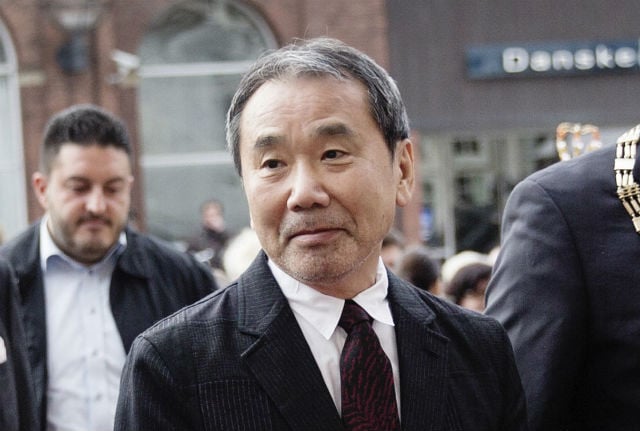NOBEL
Japanese novelist Murakami pulls out of Sweden’s ‘new Nobel’
The Japanese novelist Haruki Murakami has asked for his nomination for the 'New Nobel Prize’ to be withdrawn, so that he can concentrate on his writing.
Published: 16 September 2018 15:21 CEST

The Japanese author Haruki Murakami in Odense, Denmark, to pick up the Hans Christian Andersen award. Photo: TT
More than 32,000 people voted for Murakami and three other three writers to join the shortlist for The New Academy Prize in Literature, which they could choose from a list of 47 writers selected by librarians in Sweden.
But the Japanese magic realist, known for books such as The Wind-Up Bird Chronicle, this week emailed the prize’s founders asking to be withdrawn so that he could “concentrate on his writing, away from media attention”.
In a statement posted on the group's Facebook page, the organisers said that Murakami had in his email described the nomination as “a great honour” and wished the organisers success.
“The New Academy regrets but respects his decision,” the group wrote on Saturday.
Murakami’s departure leaves a shortlist of three: the British novelist and comic-book creator Neil Gaiman, the Vietnamese-Canadian writer Kim Thúy, and the French Guadeloupian author Maryse Condé.
In the post, the organisers stressed that the other three nominees had all “expressed enthusiasm for their nomination.”
The New Academy was founded by the journalist Alexandra Pascalidou in July, two months after the Swedish Academy announced it was postponing the award of this year’s Nobel Prize in Literature.
“I decided to do it when I heard the news one morning that they wouldn't even manage to award the prize because of all the scandal,” Pascalidou told The Local after the new award was launched.
“That was the tipping point. What is the Swedish Academy doing if they can't even fulfil their work? That was the ultimate evidence that we need to save the prize, to do it with new joined forces and show them that something else is not only possible but necessary.”
The 232-year-old Swedish Academy was thrown into crisis in March when three members stepped down over the handling of accusations of sexual harassment, financial impropriety and the leaking of the identity of past prize winners.
The organisation’s Permanent Secretary Sara Danius resigned shortly afterwards, and then in April the institution announced that the prize would be withdrawn.
The scandal began in November when Jean-Claude Arnault, the French husband of Katarina Frostenson, one of the Academy’s members, was accused of sexually harassing 18 women in an exposé by the Dagens Nyheter newspaper.
An investigation commissioned from a law firm then unearthed alleged financial improprieties around Forum, Arnault's cultural venue, and also found that he had leaked the identity of the winner of the Nobel prize to journalists and others on at least seven occasions.
When a majority of the Academy's members voted not to expel Frostenson, the three members stepped down in protest.
Url copied to clipboard!


 Please whitelist us to continue reading.
Please whitelist us to continue reading.
Member comments